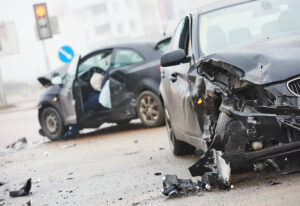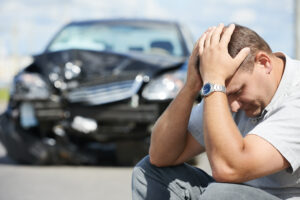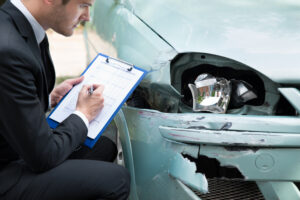
Who Pays When You Sue After a Car Accident?
You suffered severe injuries in a car accident, and you need to pursue compensation for those injuries. Where does that payment come from?
When you suffer injuries in an accident due to the negligent actions of a driver who carries auto insurance, the driver’s auto insurance will usually compensate for those injuries and damages to your vehicle. However, some car accident claims are more complicated than initially anticipated, and an experienced car accident lawyer in Seattle can help you with the legal procedures.
The Liable Driver’s Insurance Company: Your First Line of Financial Defense After a Car Accident
Following a car accident, the liable driver’s auto insurance is the primary source of compensation for damages. Nebraska auto insurance pays out vital compensation in several areas after an accident.
Damage to Your Vehicle

Vehicle damage creates a substantial cost following your auto accident. Get an estimate from an approved repair shop to ensure the insurance company covers repairs to your vehicle. The insurance company can either pay the approved repair shop directly or deposit the funds for the repairs in your account, which you can then use to pay for your repairs.
Nebraska minimum property damage insurance does not cover damage to your vehicle unless you purchase collision insurance. However, you may have other options for recovering compensation for your damages, including your own comprehensive or collision insurance. Underinsured motorist insurance ensures that you have reasonable coverage for any damages sustained to your vehicle in an accident.
Compensation for Injuries
Injury claims against an insurance company after an auto accident are more complicated than claims for property damage alone. Nebraska law requires drivers to carry bodily injury insurance that protects anyone who sustains injuries in an accident. However, insurance companies often contest the injured party’s injuries to decrease compensation.
Talk to a lawyer about the compensation you deserve for injuries sustained in an auto accident.
Discuss your medical bills from your accident and your injuries, including:
- Emergency medical transport, including ambulance rides
- Emergency medical treatment in the emergency room or at an urgent care center
- Surgeries and treatments to treat your injuries
- Durable medical equipment to aid in mobility or overall independence
- Physical or occupational therapy to regain mobility or independence after an accident
- Long-term care costs, including a stay in a long-term care facility or the cost of in-home care
You may also have the right to include compensation for the wages you lost as part of your injury claim after your accident, as well as compensation for the pain and suffering you faced. Talk to an attorney about how to calculate these expenses.
When Might the Liable Driver’s Insurance Not Pay?
The liable driver’s insurance company may refuse to pay for damages caused by an auto accident for many reasons.
Disputed Liability
The other driver’s insurance company may refute that the driver covered under their policy caused the auto accident. Sometimes, you need to provide additional evidence that the other driver’s negligent actions, rather than your own, caused the accident. In other cases, you must establish if another party contributed to the accident.
The insurance company may claim that your actions contributed to the accident or even caused it and that, therefore, you do not have the right to compensation for those injuries. You may need witness statements, video footage, or input from an expert witness to help establish who caused the accident and show that you deserve compensation for the injuries you sustained.
Outside the Policy
Many insurance policies have specific limitations on what they will cover. The insurance policy may refuse to pay for an accident that falls outside the terms of that policy.
The driver did not have coverage under the policy at the time of the accident.
 Usually, car insurance policies follow vehicles, not drivers. Yet, someone who takes a vehicle without the owner’s permission, including a thief who steals the vehicle, likely will not have insurance coverage while using that vehicle. The insurance policy may not cover drivers in the owner’s household not named on the policy.
Usually, car insurance policies follow vehicles, not drivers. Yet, someone who takes a vehicle without the owner’s permission, including a thief who steals the vehicle, likely will not have insurance coverage while using that vehicle. The insurance policy may not cover drivers in the owner’s household not named on the policy.
Suppose, for example, that the vehicle owner has a new sixteen-year-old driver who just acquired their license. That driver takes the vehicle out with parental permission and gets into an accident. The parent didn’t add the driver to the insurance yet. The insurance company might refuse to cover an accident caused by the teen because the vehicle owner did not list them on the policy.
The driver engaged in activities outside the coverage of the policy.
Some standard insurance policies may not cover a driver who drives for job responsibilities, including a delivery driver or a rideshare driver. Many major rideshare companies, including Uber and Lyft, provide extensive insurance policies that offer substantial protection if their drivers cause a car accident with an active passenger.
After an accident, an insurance provider may not cover a driver who drives for employment without informing his insurance company or ensuring adequate coverage from another source.
Who Pays if the Liable Driver’s Insurance Policy Will Not Pay?
If the liable driver’s insurance policy doesn’t cover the cost of an accident, you may have the right to sue the liable driver directly for your damages. It is often more difficult to get compensation from a driver personally. Working with a car accident lawyer is your strongest chance to maximize the compensation you recover.
What if the Other Driver Does Not Bear Full Liability for the Accident?
 Car accidents occur for many reasons, and the at-fault driver may not bear total liability for the accident.
Car accidents occur for many reasons, and the at-fault driver may not bear total liability for the accident.
Drivers make their own decisions about what they do on the road, including driving while distracted or intoxicated, ignoring the rules of the road, or not taking adequate precautions to protect pedestrians and other drivers. However, outside factors can increase the risk of an accident or even cause the accident, and the driver might not have the capacity to prevent the accident or associated injuries.
If another party contributed to your accident, you may have the right to sue that party for compensation for your damages.
The Driver’s Employer
Many people drive for a living: commercial truck drivers, delivery drivers, and construction workers, for example. When they drive for work, their employer takes at least partial responsibility for the conditions they face.
Employers need to:
- Screen people that they hire
- Carefully monitor and maintain company vehicles
- Adhere to reasonable policies that protect their drivers and others on the road
Employers who fail in their duty of care to their drivers and others on the road may bear liability when their negligent actions lead to an accident. Suppose, for example, that a company has a policy that delivery drivers must meet specific goals in their deliveries.
A delivery driver gets caught in traffic and knows he will face repercussions if he does not complete the delivery and get back to the business in time, so he chooses to speed. His speeding contributes to a severe accident. The employer may, as a result, share liability for that incident.
The Vehicle Manufacturer
Tens of millions of vehicles are recalled across the United States each year. Vehicles face recalls for everything from serious hazards, such as the risk of the vehicle bursting into flame, to hazards that cause steering challenges or brake problems.
When a vehicle manufacturer produces a dangerous vehicle, and that defect causes a serious accident, the manufacturer may share liability for any damages caused by that defect.
A Mechanic
Sometimes, a mechanical defect or malfunction occurs because the vehicle owner recently had it worked on, and the mechanic either:
- Failed to repair the vehicle properly; or
- Caused damage to the vehicle during the repairs
When a mechanic causes a severe problem with the vehicle that leads to an accident, the mechanic may share liability for the accident.
Talk to an attorney to learn who bears liability for the accident and who can pay your compensation.
For example, mechanics and other small businesses may carry their own insurance policies. You may sue a vehicle manufacturer directly rather than an insurance policy. A lawyer can investigate who is liable for a specific incident and who might issue payment.
How to Sue After a Car Accident
If you suffered injuries in a car accident, you might have the right to compensation but not know how to pursue it. Often, people who suffer serious injuries in a car accident receive low compensation because they fail to follow the claim process properly.
Step One: Report any accident involving significant property damage or injuries.
If you sustained an injury in a car accident, or you sustained substantial property damage, report the accident to the police immediately. The police can evaluate the scene, provide a report, and make it easier to move forward with your journey to compensation.
Step Two: Get any needed medical care.
Even if you do not think you sustained injuries in the accident, talk to a medical care provider to rule out significant injuries. Often, you may discover that you sustained more significant injuries than you initially thought and that, as a result, you need to pursue compensation from the liable driver.
Step Three: Contact an attorney.
If the other driver reports the accident, you may get a call from the insurance company long before you have a chance to gather your bills and evaluate how much your injuries cost. Do not accept an early settlement offer issued by the insurance company.
Ideally, talk to a lawyer before you deal with the insurance company. A lawyer can provide you with much more information about the compensation you deserve and the car accident claim process.

Your attorney will examine the damages you sustained from the accident, including your injuries and associated costs, and put together a demand package that includes your evidence and expected compensation.
Then, the attorney will submit that information to the insurance company. The insurance company will accept your demands and issue a settlement or negotiate to lower the compensation you recover.
Once you arrive at a settlement agreement, the insurance company will issue a check. The check will go to your lawyer, who will distribute it: keep some money for legal fees, pay out any liens on the settlement amount, and issue a check to you for your losses.
Do you have questions about a car accident claim, including who can pay for the damages you sustained? Contact a lawyer as soon as possible after an accident to learn more about your rights.
Boohoff Law P.A. – Seattle Office
2200 6th Ave Suite 768,
Seattle, WA 98121
Phone: (877) 999-9999











